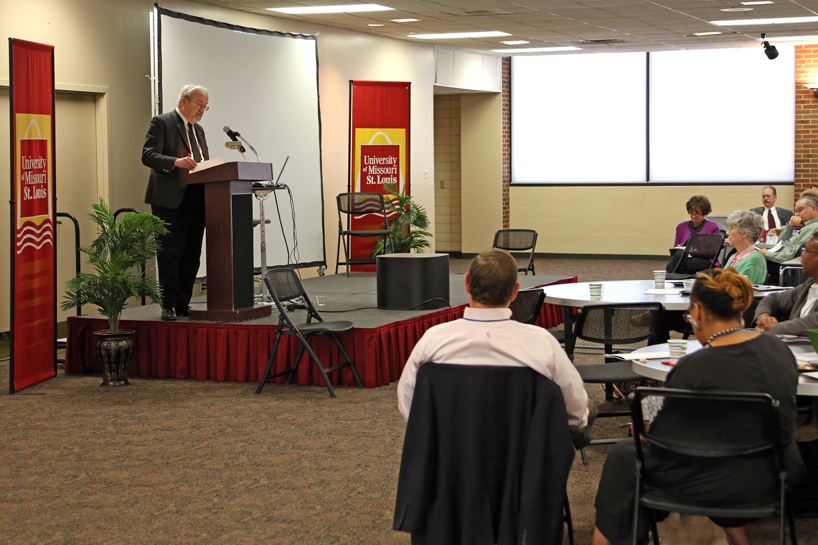
Steven Rowan, professor of history at UMSL, gives his presentation “‘Wherever Did All of Those People Come From?’: German Forty-Eighters Intervene in Missouri History” at the “St. Louis Metromormphosis” conference. (Photo by August Jennewein)
On April 25, Louis IX of France would have turned the ripe old age of 800. That is, if he was alive. France’s lone canonized king does, however, live on in history books and as the namesake of St. Louis, which happens to be celebrating its own major anniversary – 250 years – throughout 2014.
The University of Missouri–St. Louis celebrated St. Louis’ anniversary and the birth of Louis IX with the two-day conference “St. Louis Metromorphosis: The Significance of a City Across the Centuries.” About 150 current and aspiring historians attended the conference, which focused on the past, present and future of the Gateway to the West.
J. Frederick Fausz, associate professor of history at UMSL, kicked off the conference with a presentation on the adaptive identities St. Louis has taken on over the course of its two and a half centuries. He also spoke about the importance of history.
“The human lifecycle typically lasts about 80 years, so studying history is the only means of appreciating a distant unknown past that no living person actually experiences,” Fausz said. “A knowledge of the good ideas or big mistakes from earlier eras provides context for the present and may help improve the future. Realizing who or what came before is an essential component of citizenship for each generation.”
The presenters included a who’s who of historians, among them UMSL history faculty members Priscilla Dowden-White, Louis Gerteis and Steven Rowan; Todd Swanstrom, the E. Desmond Lee Professor of Community Collaboration and Public Policy Administration at UMSL; and St. Louis historians and experts from Washington University in St. Louis, Saint Louis University and several U.S. universities and St. Louis-based organizations. Fausz pointed out that they shared in common that they were professionals who represented hundreds of years of peer-assessed research and writing.
“We don’t unclog pipes or repair roofs, but we do share the joy of text – both reading it and writing it – in the belief that historical accuracy matters within and between every generation,” he said.
Lara Kuehling, who is pursuing a master’s degree in history at UMSL, was one of 25 students attending the conference through a Margaret Bush Wilson Scholarship (Wilson founded the James T. Bush Center at UMSL, which later became part of the Public Policy Research Center). A St. Louis native, Kuehling found the conference refreshing.
“St. Louis is often discussed in relation to high crime, urban decay and lingering racial segregation,” she said. “The ‘St. Louis Metromorphosis’ conference not only addressed St. Louis’ glorious and nationally significant past, but it also challenged the audience to contemplate a progressive future.”
Jason Vasser, a UMSL student pursuing an MFA in Creative Writing with a poetry emphasis and also a Margaret Bush Wilson Scholar, was intrigued by the conference’s second day, which delved more into the city’s future.
“It allowed for really rich dialog pertaining to issues of race, class and the future of our city,” Vasser said. “I hope that the conversation does not end there, but rather becomes part of the city.”
In addition to taking in the discussions, the students enjoyed access to other historians.
“History can sometimes be a solitary experience,” Kuehling said. “Often we research, write and read alone. Interacting with other historians – prominent and amateur – reminds us that we are part of a larger pursuit to uncover and make sense of the past.”
As St. Louis reflects on 250 years throughout 2014, several UMSL historians have given insight into the city’s rich history through the news media and various events about town. They’ve touched on the question of St. Louis’ founding date, fur trader and St. Louis co-founder Auguste Chouteau, the Civil War’s big economic boost for the city and the area’s original Native American inhabitants.
Want to learn more about St. Louis history on your own time? UMSL faculty and staff members have written numerous books on the subject. Here are a few:
“Civil War St. Louis” by Louis Gerteis, professor of history
“First, A Dream: Reflections for a Golden Jubilee 1963-2013” edited by Ron Gossen, senior associate vice chancellor for University Marketing and Communications
“Founding St. Louis: First City of the New West” by J. Frederick Fausz, associate professor of history
“From Neighborhood to Village: A History of Old North St. Louis” co-written by Andrew Hurley, professor of history
“Groping toward Democracy: African American Social Welfare Reform in St. Louis, 1910-1949” by Priscilla Dowden-White, associate professor of history
“Hidden Assets: Connecting the Past to the Future of St. Louis” edited by Richard Rosenfeld, Curators’ Professor of Criminology and Criminal Justice
“Lion of the Valley: St. Louis, Missouri, 1764-1980” by James Neal Primm, professor emeritus of history
“The Mysteries of St. Louis,” co-edited by Steven Rowan, professor of history
“A Photographic History of the University of Missouri–St. Louis” by Chancellor Emeritus Blanche Touhill
“St. Louis Metromorphosis: Past Trends and Future Directions” edited by Terry Jones, Founders Professor of Political Science, and Brady Baybeck, former director of the Public Policy Administration Program
“St. Louis Plans: The Ideal and the Real St. Louis” edited by Mark Tranel, director of the Public Policy Research Center
“St. Louis Politics: The Triumph of Tradition” by Lana Stein, professor emeritus of political science















